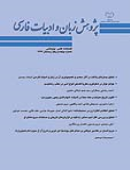عوامل مؤثر در شکلگیری نظریۀ فلسفی انواع ادبی در مکتب رمانتیسم
محورهای موضوعی : پژوهشهای ادبیات کلاسیک ایرانسید حمید فرقانی دهنوی 1 , احمد رضاييجمكراني 2
1 - دانشگاه قم
2 - دانشگاه قم
کلید واژه: مکتبهای ادبی انواع ادبی کلاسیسیسم رمانتیسم نظریه ژانر,
چکیده مقاله :
نقد و نظریه ژانر از جمله مباحث مهم نظریۀ ادبی است که از زمان ارسطو تاکنون بدان توجه فراوان شده است. اهمیت این نظریه تا آنجاست که بخش عمده ای از اصول و مبانی زیباییشناختی مکاتب بزرگ ادبی تحت تأثیر نظریه ژانر است و منتقدان این مکاتب قسمتی از مطالعات خود را به آن اختصاص دادهاند. در این میان تقابل دو مکتب کلاسیسیسم و رمانتیسم در نظریه ژانر، اهمیت ویژهای دارد. مطالعات پیشینی که به این موضوع پرداخته اند، رویکرد مکتب کلاسیسیسم به ژانرهای ادبی را تکنیکی و تجویزی و در مقابل، رویکرد مکتب رمانتیسم را فلسفی توصیف می کنند، اما درباره مؤلفه های فلسفی نظریه ژانر در مکتب رمانتیسم و مبانی فکری این نظریه، تبیین دقیقی ارائه نکرده اند. این پژوهش به دنبال تبیین و تحلیل مؤلفه های این رویکرد فلسفی و عوامل مؤثر در شکل گیری آن است. به بیان دیگر مؤلفه های این رویکرد فلسفی چیست و عوامل مؤثر در شکل گیری آن کدام است؟ نتایج این پژوهش نشان میدهد که با توجه به فلسفه ذهن گرایانه کانت و نسبیگرایی تاریخی هردر، تحولات اجتماعی، فکری و فرهنگی دوره رنسانس همچون انقلاب صنعتی، رویکرد مکتب کلاسیسیسم به ژانرهای ادبی مورد تردید قرار گرفت و مؤلفههایی همچون تاریخگرایی، نظریه وحدت سازمند، توجه به نبوغ شاعر در خلق اثر ادبی، گرایش به فردیت و نگاه ذهنی و پدیدارشناسانه، به شکلگیری نظریۀ جدید ژانر در مکتب رمانتیسم انجامید.
The genre theory or generic criticism is an important issues of literary theory that has been considered on literary studies since Aristotle. This is so considerable that much of the aesthetic principles of the great literary schools have been influenced by it, and the critics studying these movements have devoted part of their studies to the genre theory. Among literary schools, the contrast between the classicism and romanticism is very important in the generic theory. Previous studies addressing this have described classicism’s approach to the literary genres as technical and prescriptive and in contrast the romanticism's approaches as philosophical. However, philosophical components of the genre theory in romanticism have not been thoroughly explained. This research seeks to explain and analyze the components of this philosophical approach and the factors that influence its formation. In other words, what are the components of romanticism’s philosophical approach and what are the factors affecting that? This study shows that the classicism's approach to literary genres was questioned due to Kant's subjective philosophy and Herder's historical relativism and also the social, intellectual, and cultural changes of the Renaissance, such as the industrial revolution and humanism and factors such as historicism, consistent unity theory, attention to the poet's ingenuity in the creation of literary work, individualism, and subjective and phenomenological view led to the formation of a new genre theory in the school of Romanticism.
